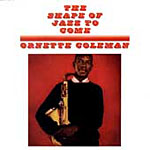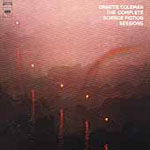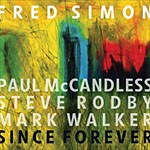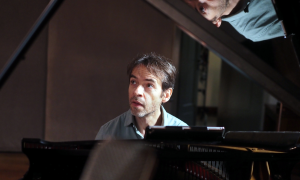Home » Jazz Articles » Interview » Ornette Coleman: Music is a Verb
Ornette Coleman: Music is a Verb
There are a lot of questions about Ornette Coleman and the music he makes. Talking with him, trying to parse these questions, can be a learning experience in many ways. Simply put, Coleman isn't like most other people. He isn't even like most other jazz musicians. He has his own distinct philosophy, of music and of life—one being just an echo of the other—and hearing him explain it can be both exhilarating and confusing.
A lot about Coleman is a mystery, wrapped up in an enigma, and deep fried in a batter of impenetrable words. Born in 1930 in Fort Worth, Texas, his father died before he had a chance to know who he was. Coleman hesitates to say much about it, but concedes that never knowing his father was probably one of the things that led him to search for, and find, expression in music.
He essentially taught himself how to play the saxophone, and was gigging by the time he was a teenager. His admiration of the legends of bebop, especially Charlie Parker and Thelonious Monk, led him to question some of the boundaries of the bands he was playing in.
"I started out in church bands," he says, and the influence shows. The Coleman sound has always been steeped in gospel and blues. He can cry with the brightest, most soul-piercing ecstasy, or chatter with the frenzy of tongues. He also played in the Texas R&B scene. He remembers, as a teenager playing those kinds of bars, that when he would play a flatted-fifth note of a scale, the resulting dissonance drove people wild.
"In America," he says, "I think the flatted-fifth is probably one of the freest sounds that can be used in any key. For me, other notes call in other keys, but it's sort of that same kind of purpose."
He also recollects the moment that he found what he was looking for in music as "when I realized that the key is more important than the notes." This approach allowed him to play any note at any time, matching the key with emotion, instead of matching notes to the traditional understanding of a chord. The resulting sound was unlike anything people had heard before.
Today, Coleman calls his music theory Harmolodics. The name is an amalgamation of harmony, movement, and melody. It's something that has been questioned left and right, and seems almost impossible for anyone other than Ornette to pin down and understand.
"It could be difficult," he admits, "but it's not difficult when you're doing it."
What people do grasp, whether they like it or not, is his sound. No matter what, Coleman's music still evokes a strong reaction from people of all listening backgrounds. Indeed, everything about him seems calculated to stand out. His trademark plastic alto saxophone, his taste in good clothes, the decidedly "out" titles of his albums—all this has only reinforced the legend behind his music.
When he came to LA to play, pianist Paul Bley heard him and helped him get a gig. The audiences weren't nearly as receptive. Undoubtedly his greatest impact came when he first came to New York City for what was originally supposed to be a two-week engagement at the Five Spot Café.
 Those two weeks stretched into six months, and effectively redefined jazz. Coleman's piano-less quartet of himself on alto sax, Don Cherry on trumpet, Charlie Haden on bass, and Billy Higgins or Ed Blackwell on drums became one of the seminal groups in jazz history, and their records on Atlantic from 1959 through 1961, including 1959's The Shape of Jazz to Come and Change of the Century, became foundational albums of any jazz collection.
Those two weeks stretched into six months, and effectively redefined jazz. Coleman's piano-less quartet of himself on alto sax, Don Cherry on trumpet, Charlie Haden on bass, and Billy Higgins or Ed Blackwell on drums became one of the seminal groups in jazz history, and their records on Atlantic from 1959 through 1961, including 1959's The Shape of Jazz to Come and Change of the Century, became foundational albums of any jazz collection. Though they met some resistance from the jazz establishment, they also inspired generations of jazz musicians in the 1960s and beyond to test the boundaries of free music. Even stalwart legends such as Miles Davis and John Coltrane followed Coleman in their own search for new things. Today, Coleman has recorded some 57 albums under his own name. Despite some absences from the scene, he insists that the musical life never became too much for him.
"I never lost any interest in knowing what a note is," he says.
His influence remains unquestionable. He's reached beyond the realm of jazz, playing with musicians as diverse as Jerry Garcia and The Grateful Dead, Lou Reed, and The Roots. Some music historians give him credit for helping start the punk revolution. And countless players working in today's jazz, rock, and avant- garde music, figures as diverse as Keith Jarrett, Joshua Redman, Sonic Youth, Patti Smith, and John Zorn all cite him as a major influence, both in composition and playing.
One of his most enlightening performances came on a trip to Africa during the 1970s. While in Morocco, he had the opportunity to jam with local musicians. The result produced two tracks on the CD version of his Primetime band's Dancing In Your Head (A&M, 1973), but are more significant in terms of what the experience provoked within him.
 "I was playing with guys from Jajouka, and they'll be in a key that hasn't been developed in other keys, like in America," Coleman recalls. It's a little difficult for him to explain in layman's terms what it was that touched him about these musicians—perhaps another kind of freedom. "So I would modulate the same sound without worrying about that key again. The result is that you can resolve your idea and still be related to the main sound of the key."
"I was playing with guys from Jajouka, and they'll be in a key that hasn't been developed in other keys, like in America," Coleman recalls. It's a little difficult for him to explain in layman's terms what it was that touched him about these musicians—perhaps another kind of freedom. "So I would modulate the same sound without worrying about that key again. The result is that you can resolve your idea and still be related to the main sound of the key." This growing interest in world music, in the sound of other cultures, has affected Coleman in his search for new sounds and freedoms. His band today features two basses and son Denardo on drums. It remains as inimitable as ever, filtering funk and world music through his own unique aesthetic. To him, it's the most basic form of communication.
"I can go anywhere, and hear any tone that's played," he says, "and I wouldn't have to know the key, but I could find the note that would match the meaning of it."
He is fascinated by humanity as a whole. To him, it's all music, and music is all humanity. One is another form of the other, like matter and energy. Perhaps for this reason, the different features of culture and ethnicity thrill him, particularly the nuances of language that convey emotion.
"Imagine how many forms of dialect make up the human language in the human world," he says. "I mean that's got to be quite a few keys! And there's nothing wrong with that.... Take Arabic, for instance. I have played with Arabic musicians, and their tonic sounds like it's going from one note to another, to change the sound of what they just played. And that is fantastic!"
Countless musicians over the years have been intrigued by the link between music and words. Many jazz musicians feel that they have to hear the lyrics of a song before they can improvise over it, no matter what the changes tell them. But for Coleman, it goes even further, beyond lyrics. He's never recorded any standards, per se, though writing and poetry hold a certain intrigue for him. His album Science Fiction (Columbia, 1971) featured a track of spoken word poetry over free improvisation along with other vocal tunes, and his 1962 Town Hall Concert (ESP) featured a dedication to writers and poets.
Yet his interest goes even further, beyond words even, to the essential nuances of speech that are generally the province of linguists instead of musicians. It's possible to hear that in the way he talks, in the questions he asks and the answers he gives. And it seems that his real intent is to find a kind of communication that doesn't discriminate, that breaks free of languages or keys, in the attempt to reach an emotional center at the core of every living person.
"I would like to play music that the human race, regardless of what language it is, can still enjoy," he says. "That's the one that I'm trying to achieve on stage, the one I keep trying to perfect—what are the actual qualities of keeping it focal without worrying about the language of the human race."
That may be the point of it all: a kind of equalizing sound that recognizes differences even as it transcends them. A universal language through plastic alto saxophone.
"I don't know how many different people have a different face, a different language, or different feeling about who we are," he says, "but it isn't the same face or the same language." He laughs. "But we all going to the bathroom!"
 Live performance represents, for him, a chance to step forward, to embrace and be embraced. For a musician such as him, who has endured controversy and criticism over the music he plays and the way he plays it, the approach seems to be the same as any other musician stepping on to the stage. So how does Coleman know, at the end of the night, that it's been a good show?
Live performance represents, for him, a chance to step forward, to embrace and be embraced. For a musician such as him, who has endured controversy and criticism over the music he plays and the way he plays it, the approach seems to be the same as any other musician stepping on to the stage. So how does Coleman know, at the end of the night, that it's been a good show? "The only thing I can say about that," he says, "is if the audience expresses their emotion to the performers and has some sort of activity in their hearts and minds to let you know they've enjoyed it. That's about as good as you can be accepted, and it does happen."
"For me," he adds, "I haven't been anywhere where it didn't happen. And not because I was looking for it to happen."
The question of what he listens to, and what he really likes, evokes a mixture of indecision and hesitation. He listens to a lot of things, has played with so many different musicians and heard them up close, that it seems unfair to list one above the other. Even dividing his preferences into the loosest of genres seems like too much.
"I like spiritual music," he says. "I like non-spiritual music. To me, the quality of sound is not about what you like; it's can you express it so someone else will like it and understand it."
When asked if this means that music is all about sharing, he answered that he would say so. When asked about the process of his own music, his answers get a little more esoteric, and perhaps a little more tongue- in-cheek.
 l:r: Denardo Coleman (hidden), Tony Falanga, Ornette Coleman, Al McDowell (hidden)
l:r: Denardo Coleman (hidden), Tony Falanga, Ornette Coleman, Al McDowell (hidden)"I've played in the key of X, Z, P, H!" he says. Just for the record, there are only twelve keys in traditional Western music, and none of them go so far down the alphabet as H.
Of course, Coleman is not playing traditional Western music. These keys he talks about seem to have less to do with a prearranged system of notes, than with an emotional reaction that he wants to share and express.
"It all comes from how you feel," he says, "and in X, it's how someone's treating you, so that you won't be irritated. You know, sometimes someone's just like, 'Oh I don't want to hear all that stuff you're playing, it sounds like S-H-I-T!'"
Some have (and continue to) dismiss Coleman, as an out-of-tune critics' darling who never had the real stuff of jazz legends, and it's been that way from the moment he burst on the scene. Certainly those gigs at the Five Spot sparked division in the jazz world. Guys like the Modern Jazz Quartet came out excited, and others like Dizzy Gillespie raised their eyebrows. Roy Eldridge famously said of him, "I've listened to him all kinds of ways. I listened to him high, and I listened to him cold sober. I even played with him. I think he's jiving, baby."
Whether he's been jiving or not, the criticism has not stopped Coleman. His last studio album, Sound Grammar (Sound Grammar, 2006), won a Pulitzer prize for Music. He was recently inducted into the Nesuhi Ertegun Jazz Hall of Fame, and in 2007 he received an honorary Grammy award for lifetime achievement. Nonetheless, he speaks very humbly about what he's done and what he plans to do.
"The only way that I think I'm staying true," he says, "is that I wasn't born being a millionaire, and I don't think I will leave the earth being a millionaire. So the thing I can be is the best human I try to attempt to be."
Does he think his life has been blessed in a way, that he's been able to make this music and move people with it?
"No, I don't think I'm blessed." He pauses in thought. "I'd like to be blessed, in the sense of what we call religion."
A scary moment occurred in 2007, when he collapsed during an appearance at the Bonnaroo music festival and had to be hospitalized for heat exhaustion. Though some may regard him as a guru, whether because of the allure that surrounds any pioneer, or because of the mystique that's grown up around the eccentricities of his character, he freely admits that there are some mysteries that he has no answers for. And he doesn't expect those answers from anyone else either.
"The word 'life' has all other qualities of knowledge in it, and I am not the one who created life. I think the closest we've come to the thing that created life is a word called 'God,' and that spells 'Dog' backwards. So that puts us in the dark."
At the time of this interview, the world had just lost three great musicians in George Russell, Rashied Ali, and Les Paul, all within a week of each other.
"I knew all three of those guys," he says. "But the thing about it is you can't become revengeable because of that. I try to get better at what I'm trying to do, spiritually as well as physically. And believe me, we have one of the greatest gifts in the world to change the emotion: your voice. The voice."
 He doesn't worry about his own music surviving, or about the crises that threaten to topple the music industry. He doesn't worry about the state of jazz today, or whether the people playing it pay tribute to him. The only things that worry him, he says, are what he sees and hears about other human beings doing to each other, the violence and killing that seem to carry across all cultures.
He doesn't worry about his own music surviving, or about the crises that threaten to topple the music industry. He doesn't worry about the state of jazz today, or whether the people playing it pay tribute to him. The only things that worry him, he says, are what he sees and hears about other human beings doing to each other, the violence and killing that seem to carry across all cultures. Today he's looking for the time to work on some new songs, or "ideas." He seems to be touring more, though he says that he doesn't know many people who are just hiring musicians to make music anymore. And he wonders about what it takes to teach a little child music, so that he or she will be able to have that as something for the rest of their life.
He speaks of music as an almost pre-determined thing. It may indeed be, not so much that Coleman has had the courage of his convictions over all these years, but that he has never had a choice, or never thought he did. Whatever sound comes out is what was always meant to come out.
"I am not interested in controlling or being the controller," he says. "I want to secede into the eternity of human beings. The most fun of life and pleasure comes from the human being, not destruction."
Whatever Harmolodics is, whether Coleman is deserving of the crown that he's been given, or whether he's just been jiving for a lifetime—all these questions ultimately matter little. What matters to Coleman, and what has always mattered, can only be found in the ears of his audiences, and within his own. That is the music.
"Imagine," he says, "that you could go and play a sound—and that's what I hope you do, play a sound that no one has heard—then all of a sudden, they're smiling and dancing and joining. That's like taking a cure, you know? That's a really good thing."
Selected Discography
Ornette Coleman Complete Live at the Hillcrest Club (Gambit, 2007)
Ornette Coleman Sound Grammar (Sound Grammar, 2006)
Joe Henry Scar (Fontana Mammoth, 2001)
Ornette Coleman/Joachim Kuhn Colors (Polygram Records, 1997)
Ornette Coleman Tone Dialing (Harmolodic, 1995)
Howard Shore/Ornette Coleman Naked Lunch (RCA, 1992)
Ornette Coleman Virgin Beauty (Portrait, 1988)
Pat Metheny/Ornette Coleman Song X (Nonesuch, 1985)
James "Blood" Ulmer Tales of Captain Black (DIW, 1978)
Ornette Coleman Dancing In Your Head (A&M, 1973)
Ornette Coleman Skies of America (Columbia/Legacy, 1972)
Ornette Coleman Complete Science Fiction Sessions (Columbia/Legacy, 1971)
Ornette Coleman New York Is Now! (Blue Note, 1968)
Ornette Coleman Who's Crazy? (Affinity, 1966)
Ornette Coleman The Empty Foxhole (Blue, Note 1966)
Ornette Coleman Town Hall Concert (ESP, 1962)
Ornette Coleman Free Jazz (A Collective Improvisation) (Atlantic, 1960)
Ornette Coleman This Is Our Music (Atlantic, 1960)
Ornette Coleman The Shape of Jazz to Come (Atlantic, 1959)
Ornette Coleman Twins (Atlantic, 1959)
Ornette Coleman Change of the Century (Atlantic, 1959)
Ornette Coleman Something Else!!!!: The Music of Ornette Coleman (Contemporary/OJC, 1958)
Photo Credits
Page 1, Madli- Liis Parts
Page 2, Mark Ladenson
Page 3, John Kelman
Tags
Ornette Coleman
Interview
Warren Allen
United States
Charlie Parker
Thelonious Monk
Paul Bley
Don Cherry
Charlie Haden
Billy Higgins
Ed Blackwell
Miles Davis
John Coltrane
Keith Jarrett
Joshua Redman
john zorn
Modern Jazz Quartet
Dizzy Gillespie
Roy Eldridge
George Russell
Rashied Ali
Les Paul
PREVIOUS / NEXT
Support All About Jazz
 All About Jazz has been a pillar of jazz since 1995, championing it as an art form and, more importantly, supporting the musicians who make it. Our enduring commitment has made "AAJ" one of the most culturally important websites of its kind, read by hundreds of thousands of fans, musicians and industry figures every month.
All About Jazz has been a pillar of jazz since 1995, championing it as an art form and, more importantly, supporting the musicians who make it. Our enduring commitment has made "AAJ" one of the most culturally important websites of its kind, read by hundreds of thousands of fans, musicians and industry figures every month.






















